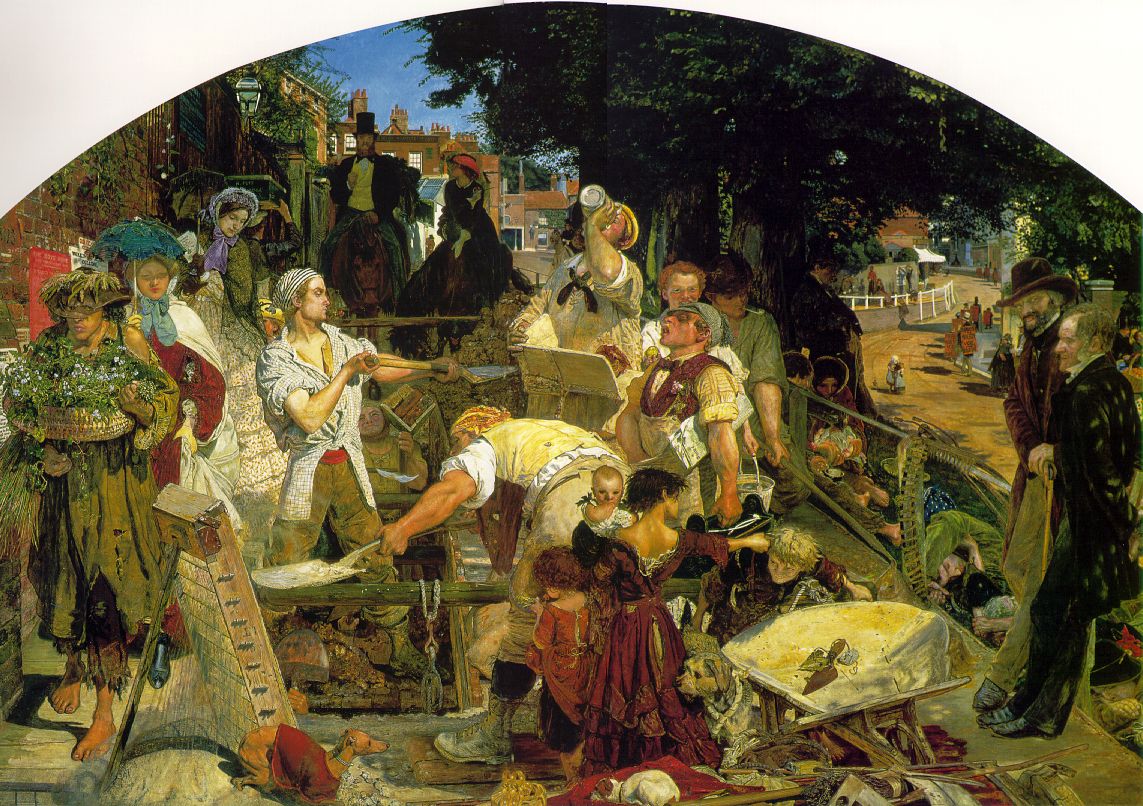The Red Children’s Stories
In nineteenth-century Britain, a rich tradition of socialist fables and children’s stories denounced the capitalist system and its frightening inequities.

“Work,” by Ford Madox Brown, 1865. Manchester Art Gallery / Wikimedia.
In the late nineteenth century, Britain was the dominant global power, administering a vast empire that encompassed huge swathes of Asia, Africa, and North America. Conquest and plunder abroad went hand-in-hand with repression and exploitation at home; the imperial system was heavily reliant on a rapidly industrializing economy powered by what was proportionally the world’s largest proletariat.
Many workers remained politically disenfranchised. While the Second Reform Act of 1867 gave men in the skilled trades the right to vote, it would take until 1928 to win universal suffrage for both men and women.
Though overworked and politically powerless, the collective experiences of miners, manufacturing workers, and others fostered both a nascent class consciousness and an interest in the emerging ideas and institutions of the socialist movement. Despite the squalor and physical strain of industrial work, a vibrant intellectual life came into being, nurtured by growing trade unions, friendly societies, political associations, and periodicals trading in fiction and non-fiction alike.
This is the context for Workers’ Tales: Socialist Fairy Tales, Fables, and Allegories from Great Britain, a new collection edited by children’s author and political columnist Michael Rosen.
Bringing together more than forty stories originally published in socialist and labor periodicals between 1884 and 1914, Rosen’s book includes entries from publications like Clarion, a magazine published between 1891 and 1935, and for a time the British socialist movement’s bestselling periodical (with a circulation of roughly thirty-four thousand in the 1890s). Also represented are publications like Commonweal — founded by novelist and activist William Morris and later edited by Marx’s son-in-law Edward Aveling — and Labour Leader, the official magazine of the Independent Labour Party. These publications and others like them played a crucial role in making socialist ideas accessible to a mass audience.
Among the authors of these stories are a few names that will be familiar to many on the Left today — notably Keir Hardie, the miner and socialist campaigner who would eventually become the Labour Party’s first MP. Others, though perhaps better known at the time, have faded from memory today. These include the likes of Caroline E. Derecourt Martyn (1867-1896) — a Christian Fabian socialist who toured the country as a popular public speaker before her untimely death from pleurisy before the age of thirty; Schalom Asch (1880-1957), a Polish Jew who composed novels, essays, and plays, writing primarily in Yiddish; and William Crawford Anderson (1877-1919), a blacksmith’s son who encountered socialism by way of an industrial apprenticeship and won a seat in Sheffield for the Labour Party in 1915.
Short and concise, the collection’s stories — many of them originally intended for children — draw heavily on both the classical fable and the fairy tale, using the simplicity of the form to illustrate and condemn the injustices and hypocrisies of class society.
In “An Old Fable Retold” (1884), which opens the book, a committee of poultry hold a debate to determine which sauce they should be eaten in at Christmastime, before one interrupts to suggest they not be eaten at all. In “The Monkeys and the Nuts” (1884), a group of monkeys collect nuts and give them to a small elite to be distributed, only to find them unevenly given out. Some complain, but are successively directed by their rulers to consider the condition of others who have even fewer until those who have nothing are finally singled out as a suspect underclass.
Another story entitled “The Political Economist and the Flowers” (1884) pokes fun at the rationalist and Social-Darwinist worldview of the educated professional classes, telling the story of a retired professor who attempts to grow flowers but is outdone by his supposedly ignorant next-door neighbor:
The Ignorant Man, looking over the fence one day, and seeing a heap of manure in the Professor’s garden, said to him: “Sir, why do you not improve the soil of your garden by spreading over it that manure in order that your flowers may have strength and beauty?”
“My good fellow,” responded the Professor, “you are a most immoral and unscientific gardener, though I forgive you on account of your ignorance. What! Would you treat all plants alike, the strong and the weak, the good and the bad? Nay, but let them contend among themselves for the soil which they have, and when I see plainly which of them flourish best in this poor soil, to them I will shortly give more manure than they will know what to do with!”
In the spirit of Britain’s progressive Christian tradition, some stories are religious in character. In “Nobody’s Business” (1892), a poor man dies alone of starvation in the heart of one of the richest cities in England. In heaven, the almighty proclaims: “The people build temples in my name, and worship me with their lips, but their hearts are far from me.”
While Workers’ Tales may read for some like an anthology of historical artifacts, many of its entries remain powerful in their ethical simplicity — conveying with force the moral urgency of the socialist critique and its continued relevance to the problem of societies that remain systemically unequal.